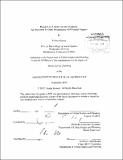Regulation of shale gas development : an argument for state preeminence with federal support
Author(s)
Kansal, Tushar, M.C.P. Massachusetts Institute of Technology
DownloadFull printable version (10.58Mb)
Other Contributors
Massachusetts Institute of Technology. Dept. of Urban Studies and Planning.
Advisor
Lawrence Susskind.
Terms of use
Metadata
Show full item recordAbstract
Shale gas development has become big business in the United States during the past decade, introducing drilling to parts of the country that have not seen it in decades and provoking an accelerating shift in the country's energy profile. State governments, which have historically regulated the oil and gas industry and continue to do so today, were in many cases caught by surprise by the speed and the scale of the shale gas boom and are still trying to update and adapt their regulatory practices to respond to the impacts that shale gas development is causing in communities in their states. In some instances, these impacts have included groundwater and surface water contamination, air pollution, exploded homes, and damage to wetlands and other habitats, among other impacts. Shale gas development has also created jobs, brought economic development to distressed communities, lowered fuel costs, and has begun to supplant coal in the nation's electricity supply. The thesis seeks to understand whether primary regulatory authority over shale gas development should rest with the states or with the federal government. In answering this question, the author applies theory from the field of regulatory federalism to the practice of shale gas development to ascertain whether the federal government or state governments are best suited to regulate shale gas development. Grounding the analysis in both regulations as-written and as-applied in a number of states that have active shale gas industries, the author uses four key criteria to gauge whether regulatory authority should rest with the central government or with the states. These four criteria are: the geographic distribution of costs and benefits associated with shale gas development; regulatory capacity at the federal level and at the state level; which level can better foster innovation, flexibility, and adaptability; and which level can better provide efficiency, certainty, and stability. The analysis finds that, in most cases, states are better situated than the federal government to regulate shale gas development on the basis of each of the four criteria. The author also subjects current regulatory practice to a two-part test to determine whether regulatory failure is currently occurring that would compel the federal government to assume regulatory authority. The results from this test are negative. The author concludes that primary regulatory authority over shale gas development should remain with state governments. Finally, the author provides four policy recommendations, two each to state governments and to the federal government, to improve regulatory practice and outcomes in the future.
Description
Thesis (M.C.P.)--Massachusetts Institute of Technology, Dept. of Urban Studies and Planning, 2012. Cataloged from PDF version of thesis. Includes bibliographical references (p. 106-118).
Date issued
2012Department
Massachusetts Institute of Technology. Department of Urban Studies and PlanningPublisher
Massachusetts Institute of Technology
Keywords
Urban Studies and Planning.